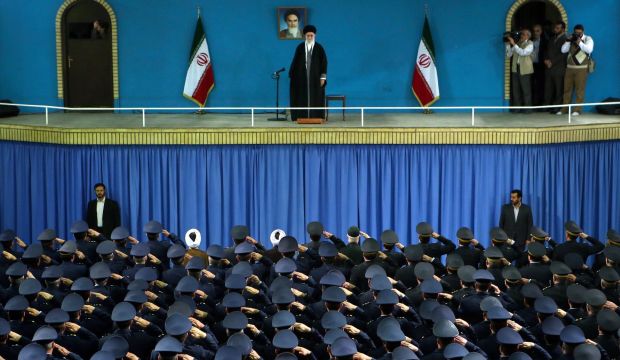
Iranian military officers saluting Iran’s supreme leader. Ayatollah Ali Khamenei, during a ceremony in Tehran, Iran, on February 8, 2015. (EPA/SUPREME LEADER OFFICIAL WEBSITE/HANDOUT)
As his foreign minister met his counterparts in the talks at a conference in Munich, Ayatollah Ali Khamenei said he “firmly” backed a fair nuclear deal.
“I would go along with any agreement that could be made. Of course, if it is not a bad deal. No agreement is better than an agreement which runs contrary to our nation’s interests,” Ayatollah Ali Khamenei told Iranian air force personnel, according to official news agencies.
In a speech that still underlined his suspicions about Western nations that he characterized as “bullies,” Khamenei backed Rouhani’s negotiations with them and said any workable deal would mean both sides easing their demands.
“As the president said, negotiations mean reaching a common point. Therefore, the other party . . . should not expect its illogical expectations to be materialized. This means that one side would not end up getting all it wants.”
“I am for reaching a good settlement and the Iranian nation too will certainly not oppose any deal to uphold its dignity and integrity,” Khamenei said, an apparent warning to hardliners that they might have to accept a deal with powers including the United States, commonly known in Iran as “the Great Satan.”
Negotiators have set a June 30 final deadline for a nuclear deal, and Western officials have said they aim to agree on the substance of such an accord by March.
In Israel, Prime Minister Benjamin Netanyahu, who will address the US Congress on Iran on March 3—to the annoyance of the Obama administration—said he would strive to thwart would be a “bad and dangerous agreement”.
“World powers and Iran are charging ahead to an agreement that would allow Iran to arm itself with nuclear weaponry, something that would imperil the existence of the State of Israel,” Netanyahu told his weekly cabinet meeting.
The nuclear talks with the United States, Russia, China, Britain, France and France are aimed at clinching a deal that would ease Western concerns that Tehran could pursue a convert nuclear weapons program, in return for the lifting of sanctions that have ravaged the Iranian economy.
Major sticking points are the pace at which sanctions would be removed, the size of Iran’s nuclear fuel-producing capacity—a key consideration in preventing any output of bomb material—and the length of any agreement.
“Our [nuclear] negotiators are trying to take the weapon of sanctions away from the enemy. If they can, so much the better. If they fail, everyone should know there are many ways at our disposal to dull this weapon,” Khamenei said.
Any deal “must be concluded in one stage and consist of clear and detailed specifications, and not subject to [various] interpretations,” he said.
“Given our past experience in dealing with the [West], a final draft must not leave any room for the other side to repeatedly extract concessions.”
Separately, Foreign Minister Mohammad Javad Zarif denied on Sunday a Reuters report quoting unidentified senior Iranian officials saying he had told the United States during the talks that Rouhani’s political clout would be heavily damaged if negotiations failed.
“I believe the entire Iranian population understands that this government, that Dr Rouhani, his administration and the government in its entirety supported our efforts in the negotiations,” Zarif told a security conference in Munich where he met counterparties in the negotiations, in what he called a “very serious discussion”.
“Everybody has taken every necessary measure to make sure we succeed. All Iranians know this. If we fail, and I hope we won’t, they [Iranians] will not consider us responsible for that failure. They will consider attempts [to ask] too much from Iran as a reason for failure.”
US Senator John McCain, a hawkish Republican, warned in Munich that while Iran was negotiating now, its underlying goal was “to drive Western influence out of the Middle East.”
